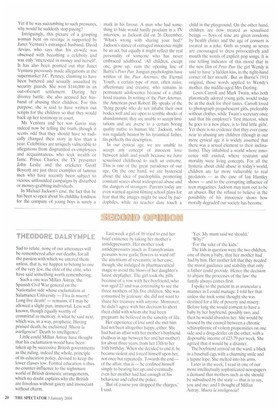THEODORE DALRYMPLE
Sad to relate, none of our utterances will be remembered after our deaths, for all the passion with which we uttered them: unless, that is, we happen to belong to one of the very few, the elite of the elite, who have said something worth remembering.
Such a one was Milian Astray, the Spanish Civil War general on the Nationalist side whose exclamation at Salamanca University — Viva la muerte! Long live death! — remains, if I may be allowed a slight pun, immortal. Less well known, though equally worthy of committal to memory, is what he said next, which was, in a way, prophetic. Having praised death, he exclaimed Muera la inteligencia!' Death to intelligence!
Little could Milian Astray have thought that his exclamation would have been taken up by successive British governments as the ruling, indeed the whole, principle of its education policy, devised to keep the lower classes low. Formal education is thus no counter-influence to the nightmare world of British domestic arrangements, which no doubt explains why the British are frivolous without gaiety and insouciant without charm. Last week a girl of 16 tried to end her brief existence by taking her mother's antidepressants. Her mother took antidepressants much as Transylvanian peasants wore garlic flowers to ward off the attentions of revenants: in her case, though, she indulged in pharmaceutical magic to avoid the blows of her daughter's latest stepfather. The girl took the pills because of a row with her boyfriend, who was aged 23 and was continuing to see the three mothers of his five children. She was consumed by jealousy: she did not want to share her treasure with anyone. Moreover, he didn't agree with her decision to abort their child with whom she had been pregnant: he believed in the sanctity of life.
Her experience of love until she met him had not been altogether happy, either. She had had an affair with her mother's boyfriend (halfway in age between her and her mother) for about three years, from her 13th to her 16th birthday. When she decided to end it, he became violent and forced himself upon her, not once but repeatedly. Towards the end — of the affair, that is — he confined himself simply to beating her up, and eventually even her mother had had enough of his behaviour and called the police.
'But of course you dropped the charges,' I said. 'Yes. My mum said we should.'
'Why?'
'For the sake of the kids.'
The kids in question were the two children, one of them a baby, that her mother had had by him. Her mother felt that they needed the moral guidance and stability that only a father could provide. Hence the decision to abjure the processes of the law: the family always comes first.
I spoke to the patient in as avuncular a manner as I could manage. I told her that unless she took some thought she was destined for a life of poverty and misery. Before long she would consent to have a baby by her boyfriend, possibly two, and then he would abandon her. She would be housed by the council between a chronic schizophrenic of violent propensities on one side and a drug-dealer on the other, with a disposable income of £23.79 per week. She agreed that it would be a disaster.
The boyfriend arrived on the ward, a black in a baseball cap, with a charming smile and a lupine lope. She melted into his arms.
Later in the week, I read in one of our more intellectually sophisticated newspapers a demand that mothers such as she should be subsidised by the state — that is to say, you and me: and I thought of Milian Astray. Muera la inteligencia!


























































 Previous page
Previous page